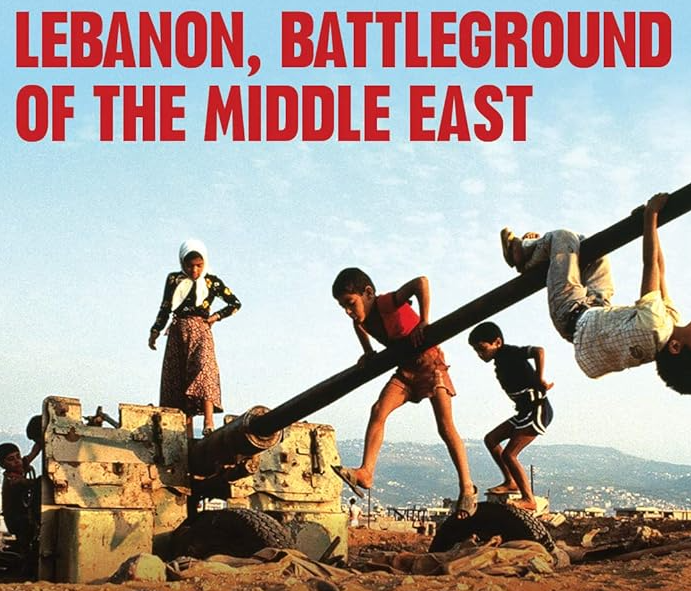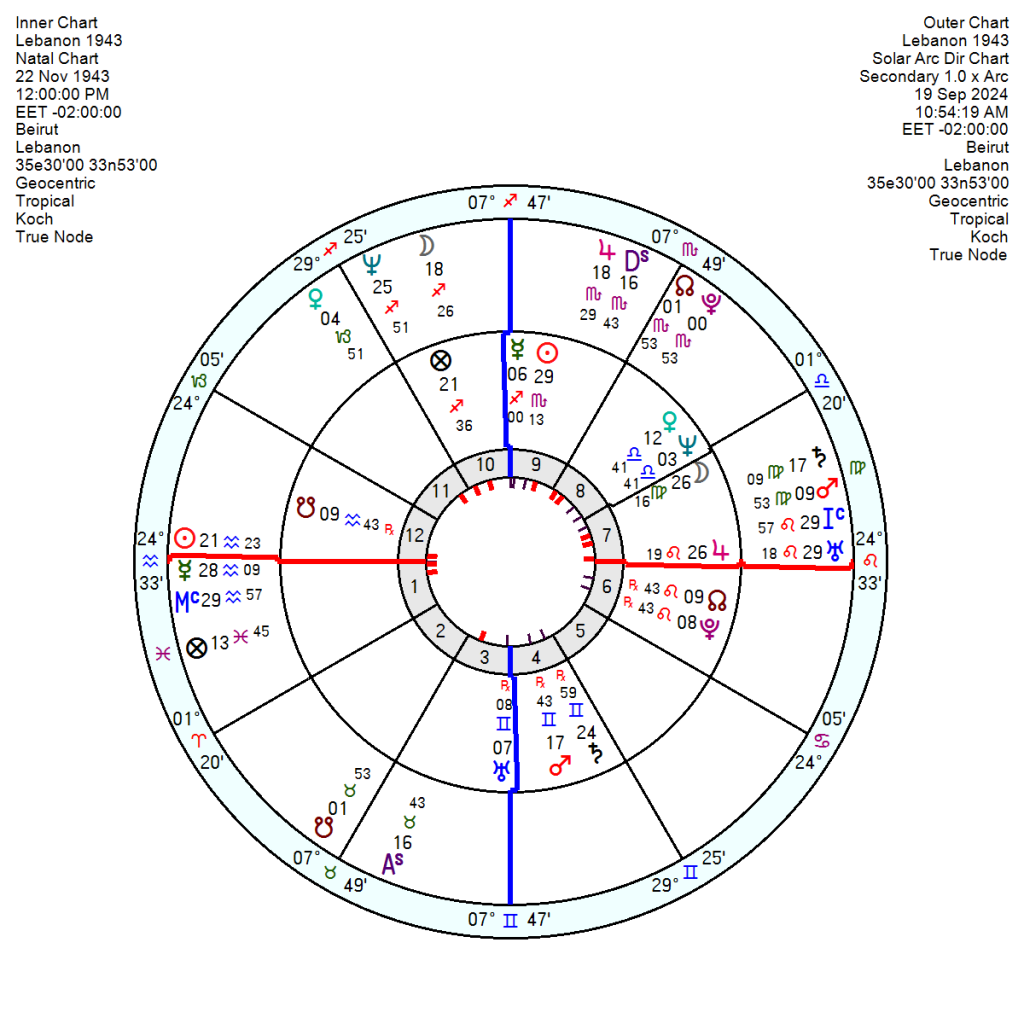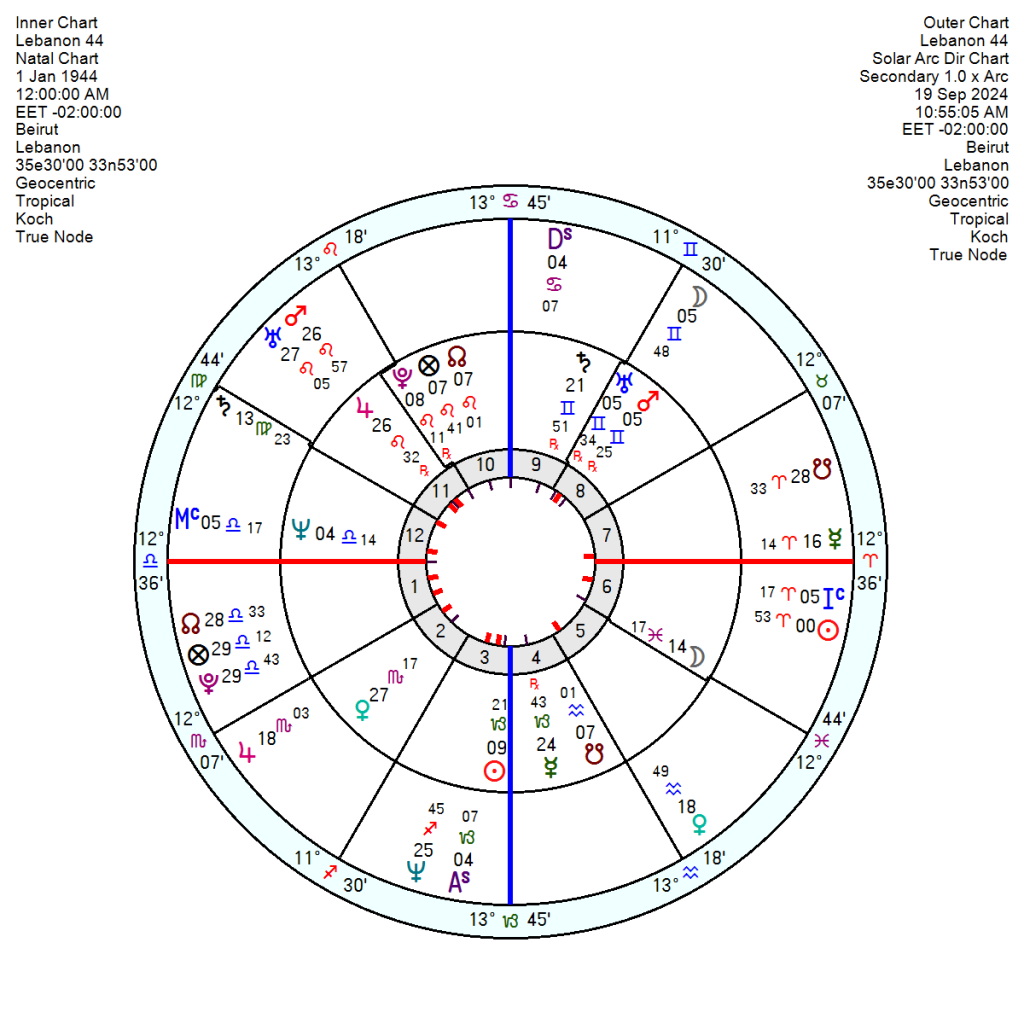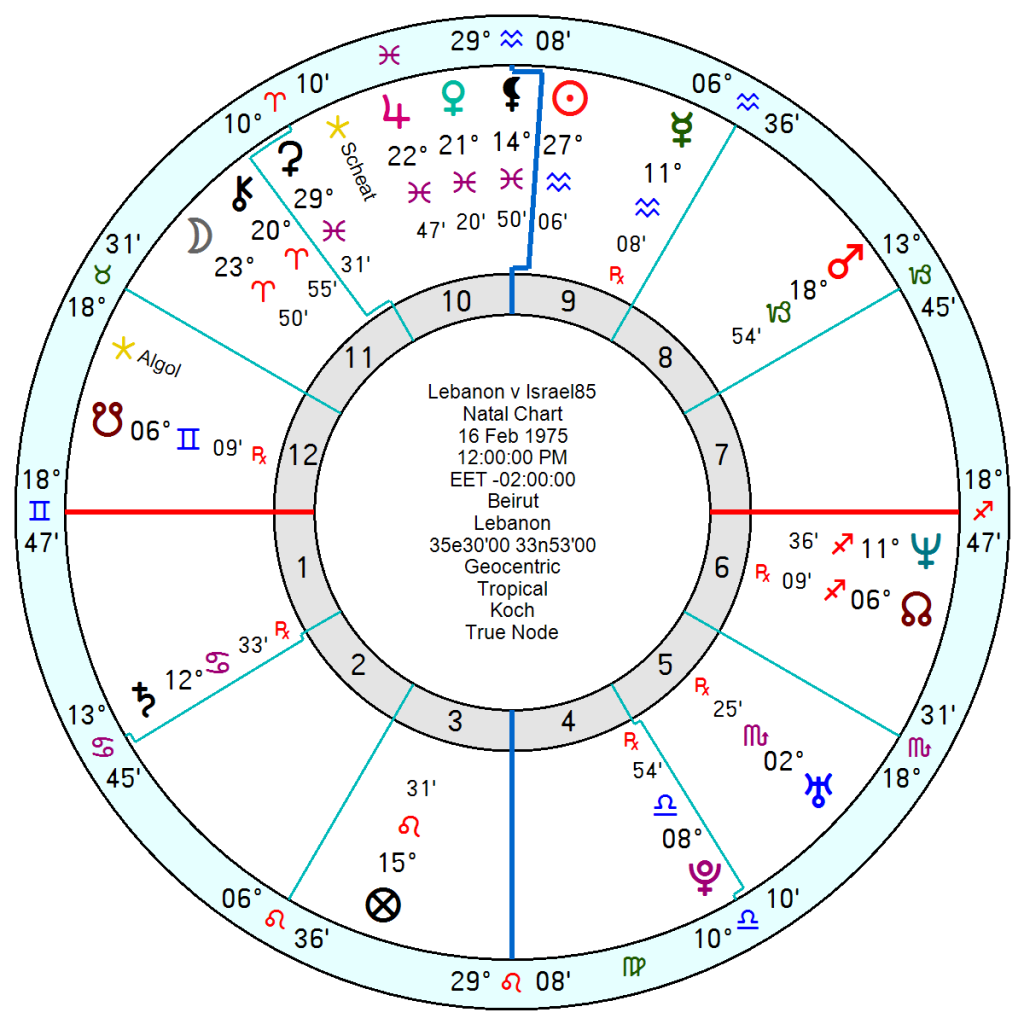



The Lebanon has had an illustrious history stretching back several millenia being a major centre under the Byzantine Empire and ultimately under the Ottoman Empire. In the colonial carve up after World War 1 it was handed as a mandate along with Syria to France, who made a botch of their ultimate withdrawal with 22 November 1943 being celebrated as the symbolic moment of independence though officially it happened on 1 January 1944.
Subsequently this state, no bigger than Wales that has become “battleground for one of the defining conflicts of twentieth-century history. Throughout its short existence, it has been attacked, invaded, occupied or interfered with to serve the political interests of foreign powers, resulting a series of devastating wars and crises. To understand Lebanon’s history is to understand the history of the entire region – and, with the rise of Hezbullah, it has come to assume a disproportionate, dangerous power of its own. Iran and Israel now face each other in the hills of south Lebanon.” (Beware of Small States: Lebanon, Battleground of the Middle East by David Hirst. Amazon).
During the Civil War (1975-1990) there were invasions and military occupations by Syria from 1976 to 2005 and by Israel from 1985 to 2000.
Hezbollah was established by Lebanese clerics primarily to fight the 1982 Israeli invasion of Lebanon. Close ties have developed between Iran and Hezbollah. During the Lebanese Civil War, Hezbollah’s 1985 manifesto listed its objectives as the expulsion of “the Americans, the French and their allies definitely from Lebanon, putting an end to any colonialist entity on our land”.
Both the Lebanon 1 January 1944 chart with its Uranus Mars in Gemini sextile Pluto inconjunct a Capricorn Sun; and the 22 November 1943 with its final degree Scorpio Sun and late Virgo Moon work reasonably well against subsequent events.
The previous Israel war with Lebanon from 13 April 1975 with Uranus at zero degrees Scorpio and a Pluto in Libra opposition Jupiter square Saturn has no real parallels instantly with the next warlike Saturn square Pluto not turning up until 2028. Though Israel’s future does look on high stress well into the next decade so it may come.
There is a depressing sense of an unwinnable, ongoing and fundamental schism with deep historical roots that flares up from time to time, dies down but never goes away.
See previous post October 10 2023 on James Cameron’s book The creation of the state of Israel.
“The introduction of the Jewish State into the Arab heartland exalted many hearts and broke many more. More than anything in this century it was a triumph and a desolation. Full of high hopes it produced the most intractable conflict of our times.” So wrote journalist and world affairs commentator James Cameron, in 1976. What follows comes from his excellent, dispassionate, lucid and brief book ‘The Making of Israel.’ The quotes are his.
Where it began. Theodor Herzl a cultivated Viennese journalist outraged by the Dreyfus scandal when a Jewish officer in the French army was framed on a treason charge lit a flame under the idea of a Promised Land where Jewish people could live free of persecution and hostility, funded by rich Jewish interests. Zionism was born with the First Zionist Congress held in Basel 29 August 1897.
Chaim Weizmann, who later became the first President of Israel, joined. He was an eminent biochemist who gave great service to the British government during World War One. ‘It was he who extracted from the then British Foreign Minister through gratitude, expediency, absent-mindedness, not one will ever know – the famous Balfour Declaration.’
‘It was ambiguous, elusive, provocative, but it was the springboard.’ To the Arabs it was an act of outright imperialism to wilfully dispose of the future of a territory to which Britain had had no rightful claim, without any consultation with the 92% non-Jewish part of the population. ‘To the British it was an afterthought, to Jewish people a green light.’
During the British Palestine Mandate (1920 to 1948) the indigenous Arabs were constantly dispossessed from their land as the Jewish communities burgeoned. Conflicts grew and ‘Palestine becomes an arena of endless guerilla warfare.’ ‘The aspirations of the Jews and Arabs are irreconcilable.’
Along comes World War 11 and the Holocaust. Jewish immigration is still strictly limited by the British to 1500 a month. In desperation illegal ships bring in more, including the Exodus carrying 4500 survivors of the death-camps, which the British Navy inexplicably rammed and returned to Germany on the orders of Ernest Bevin, the Labour Foreign Minister, whose dislike to the Jews was well known backed by the traditionally Arabist UK Foreign Office.
‘Almost every independent newspaper in the world reported the Exodus with incredulous horror. Much of what happened in the Mandate must be considered against this dismal betrayal.’
In Palestine sections of the Jewish community have decided violence is the only way to make a difference to their cause. The British Mandatory Authority are now exasperated. ‘No conceivable proposal that suits the Arabs can possibly mollify the Jews.’ In 1947 the British government decides to toss Palestine back to the United Nations. The UN tries for partition which is turned down flat by the Arabs. ‘By now it is abundantly clear that no compromise any mortal man can devise is going to reconcile the Arabs to the legal existence of a Jewish state in the Middle East.’
There are attacks and counter-attacks inside Israel, roads are blockaded and the massacre at Deir Yassin follows. Mass panic sends Palestinian refugees fleeing from their villages – 6000 from Tiberias, 40,000 from Haifa.
‘The stage is now ready for the culmination of the story, of a sick and sorrowful conflict, not between right and wrong, but between two forms of right and, maybe two forms of wrong.’
In spring of 1948 there is no government and no mandate authority, the country was ‘a shifting mosaic of overlordships.’ ‘It is possible that there was no specific British intention to leave chaos behind them but is is sure that no particular effort was made to prevent it.’
In the US the partition principle was accepted but with diminishing enthusiasm. The State and Defence department were against it because it could open the Middle East to Russian interference and jeopardise Arab oil. While President Harry Truman wanted to conciliate the domestic Jewish vote.
As time wore on Harry Truman, like the British before him, became exasperated at being pounded by constant pressure from the Zionists. ‘The Jews are so emotional ,’ he wrote, ‘and the Arabs so difficult to talk with that it is impossible to get anything done.’
Truman dithered, his underlings put out conflicting messages, until eventually a school friend introduced him to Weizmann and he decided that he would look foolish to abandon his earlier acceptance of partition.
A week before the British mandate ended there was still no certainty of a dominantly Jewish state although many Arabs had fled by this time. Various Arab armies stood at the ready including a Jordanian one backed by the British aiming to capture the areas laid down in the Partition for the Arabs. There was a massacre at Etzion killed 70 Jewish settlers in retaliation for Deir Yassin. Two days before the mandate ended another Arab attack on a medical convoy killed 77 Jewish doctors, nurses and helpers. The British refused to intervene pointing to Deir Yassin. At this point Jerusalem was under siege so the administration of the new country was moved to Tel Aviv. On the day itself the British moved out and the Jewish government, under David Ben Gurion, declared itself in charge.
‘And no one lived happily ever after.’
James Cameron’s epilogue from 1976
“Three times in the last quarter century I have personally seen the endless tensions of the Middle East build up their content of hate and fear until it burst across the Israel-Arab borders, in one direction or another, leaving its predictable residue of triumph and defeat and sorrow and recrimination and solving nothing. Each time the world knew uneasily that the next time would be worse, and it was. Each times the wounds were deeper and the scars more brutal. Each time the world protested this could not go on, while perpetuating the factors that made it inevitable.
By and by a new generation will grow up in the Middle East, both Arab and Israeli, which will reject the role of pawns in the Power Game, refuse the importunities and persuasions of the strong and cynical, and recognize, as many voiceless patriots already recognize, that what is done is done, and that both sides must make a future together, if there is to be one at all. Amen.”

Thank you for this write-up, Marjorie. No wonder there’s such a huge Lebanese diaspora, with Lebanese scattered around the world. I believe more people of Lebanese descent belong to the diaspora than live in the region.
I’ve never made it to Lebanon, though my parents were posted to Beirut while I was stuck in boarding school in England, during a blissful time of peace. Both spoke glowingly of the beauties of Lebanon and brought souvenirs of their stay there, which I cherish to this day. My husband visited there regularly with his late first wife while resident in Cyprus in the same time frame of the late ’60s. I do feel the ties to Lebanon and still hope to visit one day.
@ Nicole Sours Larson,
You are correct. There are indeed more Lebanese living outside of Lebanon than in the country itself. In fact, various sources estimate that around 14 million Lebanese live in diaspora and the vast majority of them live here in the Americas (Latin America, to be exact).
Brazil is home to the world’s largest Lebanese diaspora – it’s estimated that possibly as many as 7 million Brazilians are of Lebanese heritage. Argentina, Colombia, Venezuela, and the United States also have Lebanese populations of over 1 million.
I live in Jacksonville, Florida and my city was listed as having the 10th largest “Arab American” population in the United States. The vast majority of West Asian Americans here in Jacksonville, Florida are of Maronite Catholic and Oriental Orthodox Lebanese heritage.
Here’s a little more interesting trivia about the Lebanese community in my city. The Lebanese community here in Jacksonville, Florida is one of the oldest immigrant communities – many where born and raised here and many of their families date back to the 1890s. Many members of the Jacksonville, Florida Lebanese community have taken Anglo names over the the past century…but they’ve still maintained their cultural traditions and have kept their ties with Lebanon.
Some Lebanese-American families here in Jacksonville, Florida (and here in Florida as a whole) have become quite wealthy and prominent and have even become part of Floridian and Southern “high society” – even marrying their sons and daughters off into other Southern high society families from Atlanta, Memphis, New Orleans, Savannah, and so on.
A few famous Lebanese-Americans here in Florida include:
• Former Democratic First Lady of Florida Adele Graham – who was born and raised in Miami, the wife of late Democratic Governor and U.S. Senator Bob Graham
• Former Democratic Congresswoman Gwen Graham – who was born in Miami Lakes, daughter of the late Governor and U.S. Senator Bob Graham and First Lady Adele Graham
• Former Democratic Mayor of Jacksonville, Florida Tommy Hazouri – who was born and raised here in Jacksonville, Florida and became the first mayor of Lebanese heritage in 1987.
• Singer and radio and television personality Virginia Atter Keys – she lived most of her life here in Jacksonville, Florida and she became a local celebrity back in the 1950s and 1960s. She’s been called “Jacksonville’s first lady of television and the grande dame of Jacksonville radio” She had her own show “The Virginia Atter Keys Show” and even co-directed and produced “The Glenn Reeves Show” in the 1950s and 1960s. Keys often socialized with Floridian blue bloods and society families and she apparently used to sing at events for Floridian Democratic politicians back in the 1950s, 60s, and 70s.
• Our current Democratic Mayor here in Jacksonville, Florida, Donna Deegan – who was born and raised in Jacksonville Beach, Florida. She’s Tommy Hazouri’s cousin and she was a broadcast journalist in our state for many years. Deegan is a local icon and celebrity and she’s also a 3 time breast cancer survivor and breast cancer awareness advocate. Deegan does a lot of humanitarian and charity work for our city and she even started the Donna Foundation to help low-income women fighting breast cancer. Deegan’s husband is a popular meteorologist and weatherman for one of our local news stations.
Anyway, since you mentioned the Lebanese diaspora, I just felt like sharing a little interesting trivia. I too feel some connection to Lebanon. It could be my Mediterranean heritage…or…it could simply be because I’ve grown up a city where there is such a large Lebanese presence.
Pager bombs then on Wednesday deadly walkie-talkie explosive devices.
https://www.cnn.com/world/live-news/lebanon-pagers-explode-hezbollah-israel-09-18-24-intl-hnk/index.html
Andre- what tragic events of 2028? Thanks.
Each of the last three Uranus Returns, the US has been involved in war; the American Revolutionary War, the US Civil War and WWII.
So presumably the US will be at war, either with itself or elsewhere in 2028.
Thanks Unmystic. I’m thinking with itself this time. So many folks here would rather it all burned to the ground than letting others have access to health care, services, etc. Hopefully, Fox News will be defunct by 2028.
This could and probably will get a lot worse. Netanyahu and Jewish messianic nationalists may think they have the upper hand and that the US will always have their back. They are about to have a US woman President who may be more critical and even-handed. Moreover, the tragic events of 2028 during the US Uranus return may mean the US will have its hands full in Asia and Eastern Europe, and may not be able to provide an aircraft carrier every time Israel goes too far.